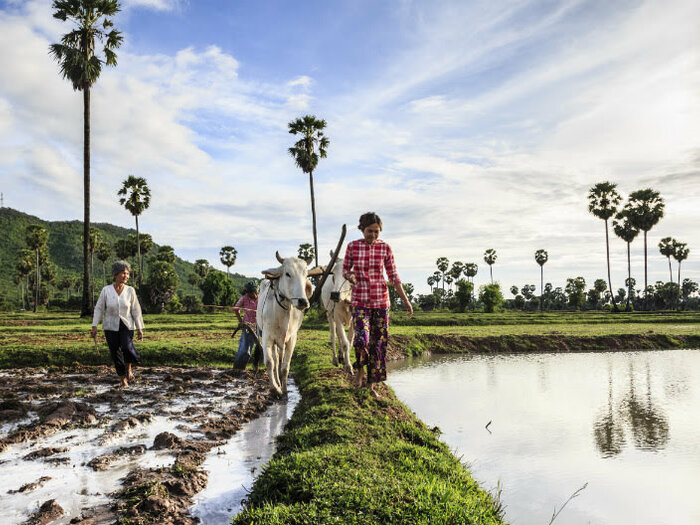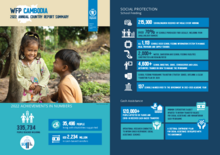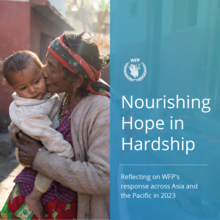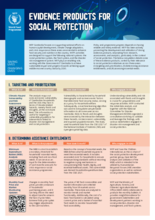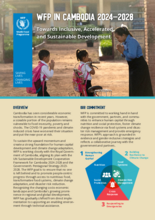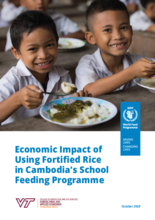Cambodia
- 15%
- of people are under-nourished
- 32%
- of children under 5 are stunted
- 16 million
- population
Cambodia has achieved sustained economic growth over the past two decades. Despite substantial progress, socio-economic and gender inequalities persist, hampering access to a nutritious diet. Food security and nutrition face challenges caused by shocks, a rapidly changing food environment and inefficiencies in the food system.
Undernutrition is widespread, and 32 percent of children under 5 years of age are stunted, while 10 percent suffer from wasting. This is due to a combination of factors: the food children are eating is not enough food and it does not contain the nutrients they need to grow and develop. Dietary deficiencies in zinc, iodine and B-vitamins also widely affect women of reproductive age and children.
Undernutrition is estimated to cost Cambodia approximately 1.7 percent of its annual GDP and is a major contributor to mortality and decreased health and productivity. In addition, overweight and obesity are increasing – 18 percent of women of reproductive age are overweight or obese (mostly older women), while 14 percent are underweight (mostly younger women).
What the World Food Programme is doing in Cambodia
-
Homegrown school feeding programme
-
WFP works with the Ministry of Education, Youth and Sport and the National Social Protection Council to promote access to quality education, nutritious diets and social assistance for children at pre-primary and primary school. The school feeding programme will transition to a nationally owned home-grown school meals model that sources ingredients from local farmers, incorporates food quality and safety, encourages community ownership, and supports local economies.
-
Sustainable and resilient food systems
-
WFP works closely with the Government to support commune councils to develop and implement climate-smart plans that will help communities to become more resilient to climate shocks. Working with partners, including the Ministry of Agriculture, Forestry and Fisheries, WFP will leverage its experience in data management platforms to facilitate the flow of information on agriculture, markets and climate services to end users at subnational level.
-
Emergency preparedness and response
-
WFP works closely with partners to strengthen national capacities and develop tools to improve preparedness for weather extremes. WFP also provide emergency assistance and early recovery supports to vulnerable households affected by natural disasters, while contributing to develop and operationalize the national shock responsive social protection framework to enable the Government to respond to multilevel shocks in a timely and efficient way.
-
Digital transformation
-
Utilising digital solutions, such as Platforms for Real-time Information Systems (PRISM), WFP supports the development and use of information systems, tailored to the needs of government counterparts responsible for disaster management, education, food security and nutrition. WFP also contributes to building national information management capacities working in close collaboration with the Ministry of Post and Telecommunications and the Ministry of Planning.
-
Food security, nutrition and social protection governance
-
WFP supports the Council for Agricultural and Rural Development and the National Social Protection Council to accelerate action towards zero hunger. This includes the formulation and execution of national strategies related to improving food security, nutrition and social protection. WFP also works with partners such as the National Institute of Statistics to enhance data collection and broaden the evidence base on food security and nutrition to enhance decision-making.
-
Supply chain services
-
WFP, the Green Trade Company and the Ministry of Commerce explore on-demand supply chain services for partners (including storage services, warehouse management, transportation, handling, and clearance). WFP also engages with humanitarian and development partners to identify supply chain gaps and strategies for filling these. WFP maintains warehouse spaces, services and transport capacities so these are ready to support any emergency response.
Cambodia news releases
Go to pagePartners and donors
Find out more about the state of food security in Cambodia
Visit the food security analysis pageContacts
Office
House 108, Street 63, Sangkat Boeung Raing, Khan Daun Penh
Phnom Penh
Cambodia

